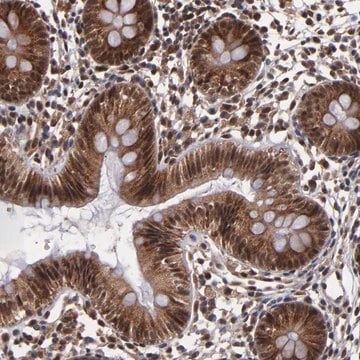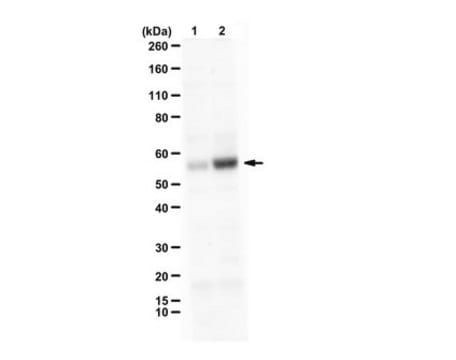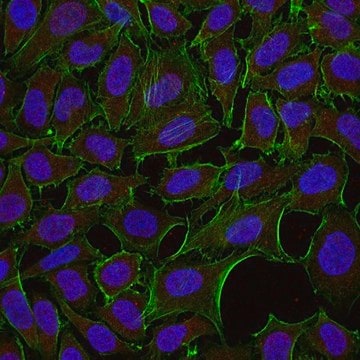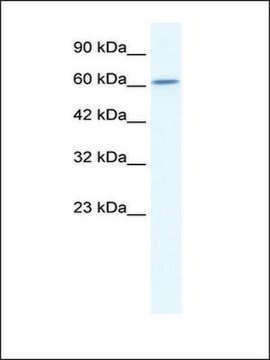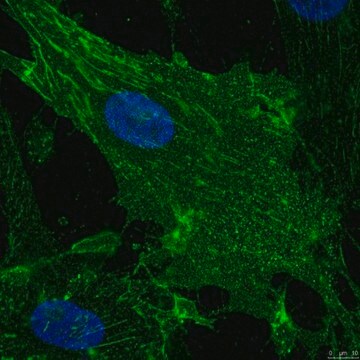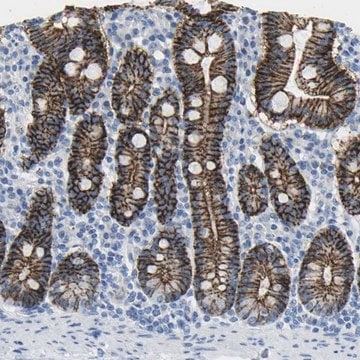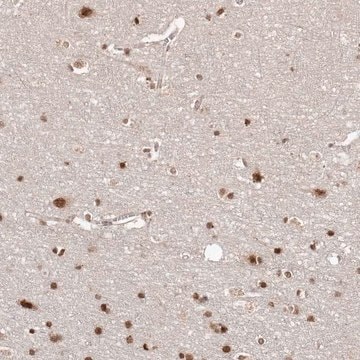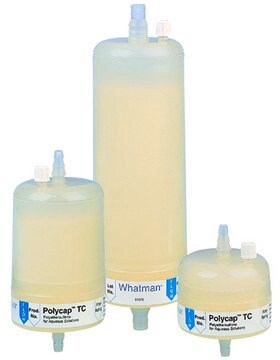推薦產品
生物源
rabbit
品質等級
抗體表格
affinity isolated antibody
抗體產品種類
primary antibodies
無性繁殖
polyclonal
純化經由
affinity chromatography
物種活性
human
物種活性(以同源性預測)
rabbit (based on 100% sequence homology)
技術
immunohistochemistry: suitable
western blot: suitable
NCBI登錄號
UniProt登錄號
運輸包裝
wet ice
目標翻譯後修改
unmodified
基因資訊
human ... CUL5(8065)
一般說明
CUL-5/VACM-1 (cullin-5, vasopressin-activated calcium mobilizing receptor 1) is one component of the ECS (elongin B/C-cul2/cul5-SOCS box protein) complex that forms an E3 ubiquitin ligase that covalently binds ubiquitin to proteins targeted for degradation via the proteasome. CUL-5 is ubiquitously expressed in the central nervous system and in many peripheral organs. Human immunodeficiency virus-1 (HIV-1) protein Vif forms a Skp1-cullin-F-box (SCF)-like complex with CUL-5/VACM-1 and Elongins B and C. The ability of Vif to suppress the antiviral activity of APOBEC3G, which induces hypermutations in newly synthesized viral DNA, is specifically dependent on CUL-5-SCF function, as it allows Vif to interact with APOBEC3G and induce its ubiquitination and degradation. The CUL-5-SCF pathway used by Vif is thus a potential target for antiviral development. CUL-5/VACM-1 inhibits cellular growth by a mechanism that involves MAPK and p53 signaling pathways. In human tissues expression in kidney, brain, heart, placenta, and skeletal muscle is observed. CUL-5/VACM-1 is also expressed in both breast epithelial cells and breast cancer cells. Decreased expression of CUL-5/VACM-1 may play a role in breast tumorigenesis. Further evidence for this finding is observed in T47D breast cancer cells in which overexpression of CUL-5/VACM-1 significantly attenuates cellular proliferation and MAPK phosphorylation when compared to control cells.
特異性
Other homologies: Feline (93% sequence homology) and Mouse and Rat (87% sequence homology).
This antibody recognizes Cullin-5 near the N-Terminus.
免疫原
Epitope: Near N-Terminus
KLH-conjugated linear peptide corresponding to human Cullin-5 near the Near N-Terminus.
應用
Detect Cullin using this rabbit polyclonal antibody, Anti-Cullin-5 (CUL5) Antibody validated for use in western blotting & IHC.
Immunohistochemistry Analysis: A 1:2,000 dilution from a representative lot detected Cullin-5 in human placenta and human testis tissue.
Research Category
Neuroscience
Neuroscience
Research Sub Category
Developmental Signaling
Developmental Signaling
品質
Evaluated by Western Blotting in human heart tissue lysate.
Western Blotting Analysis: 1.0 µg/mL of this antibody detected Cullin-5 in 10 µg of human heart tissue lysate.
Western Blotting Analysis: 1.0 µg/mL of this antibody detected Cullin-5 in 10 µg of human heart tissue lysate.
標靶描述
~90 kDa observed. Neddylation of Cullin-5 at a.a. 724 with NEDD8 results in a 10 kDa increase in molecular weight (Hori. T., et al. (1999). Oncogene. 18(48):6829-6834).
聯結
Replaces: AB10622
外觀
Antigen Affinity Purified
Purified rabbit polyclonal in buffer containing 0.1 M Tris-Glycine (pH 7.4), 150 mM NaCl with 0.05% sodium azide.
儲存和穩定性
Stable for 1 year at 2-8°C from date of receipt.
分析報告
Control
Human heart tissue lysate
Human heart tissue lysate
其他說明
Concentration: Please refer to the Certificate of Analysis for the lot-specific concentration.
免責聲明
Unless otherwise stated in our catalog or other company documentation accompanying the product(s), our products are intended for research use only and are not to be used for any other purpose, which includes but is not limited to, unauthorized commercial uses, in vitro diagnostic uses, ex vivo or in vivo therapeutic uses or any type of consumption or application to humans or animals.
Not finding the right product?
Try our 產品選擇工具.
儲存類別代碼
10 - Combustible liquids
分析證明 (COA)
輸入產品批次/批號來搜索 分析證明 (COA)。在產品’s標籤上找到批次和批號,寫有 ‘Lot’或‘Batch’.。
Si Chen et al.
Science advances, 9(3), eabq1395-eabq1395 (2023-01-21)
Breast cancer-associated gene 1 (Brca1) deficiency induces the onset of breast cancer formation, accompanied with extensive genetic alterations. Here, we used both the sleeping beauty transposon mutagenesis system and CRISPR-Cas9-mediated genome-wide screening in mice to identify potential genetic alterations that
我們的科學家團隊在所有研究領域都有豐富的經驗,包括生命科學、材料科學、化學合成、色譜、分析等.
聯絡技術服務